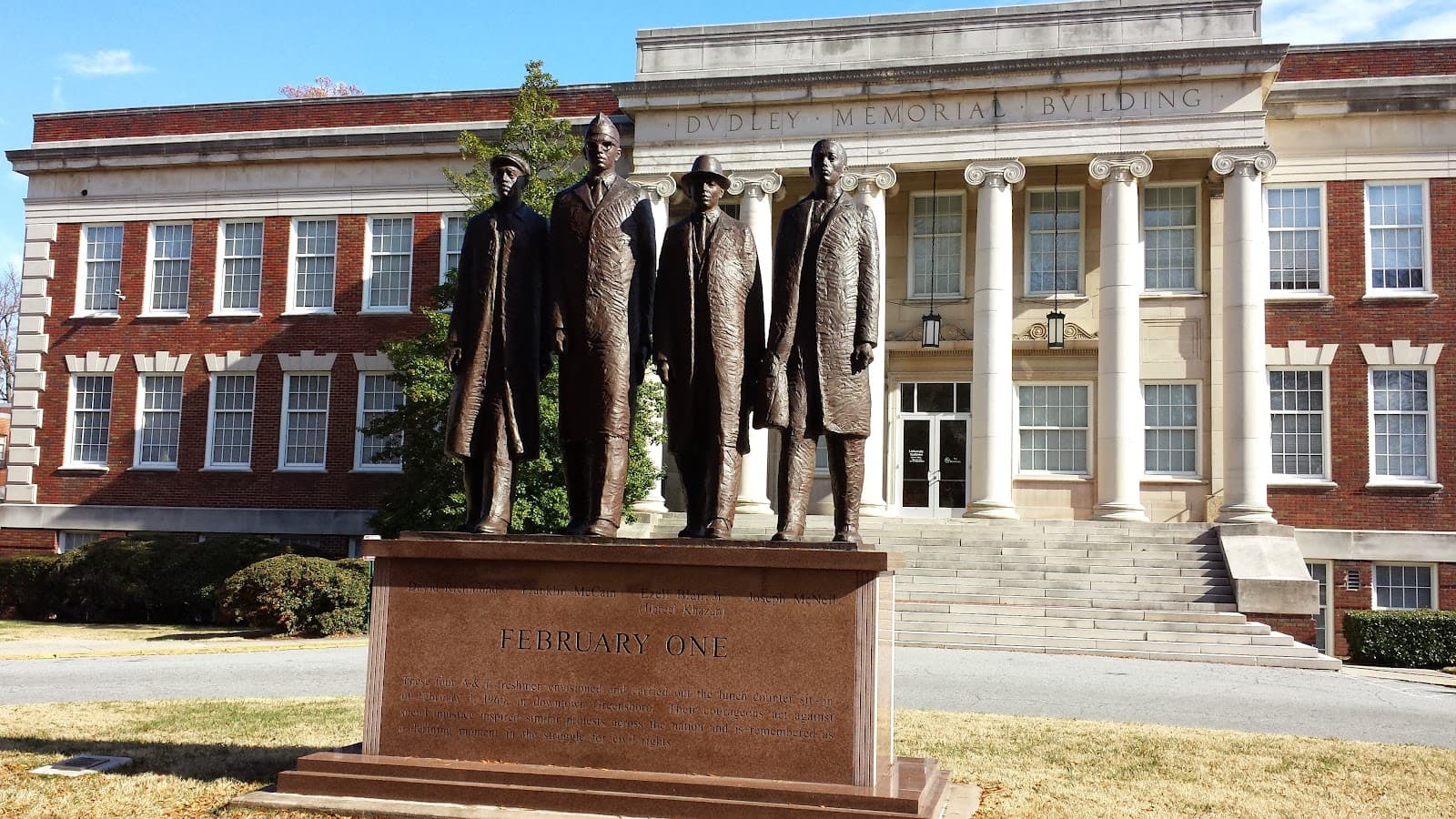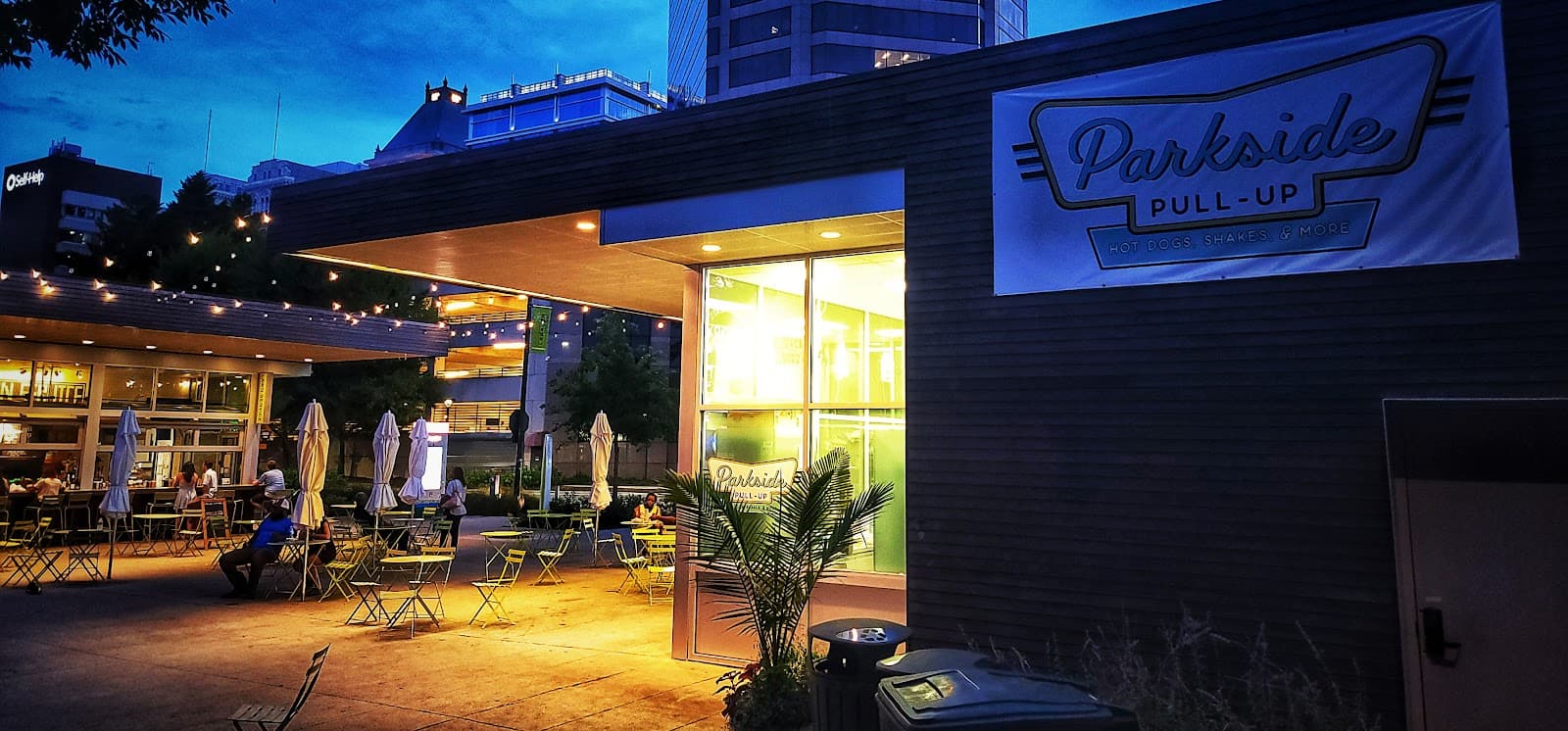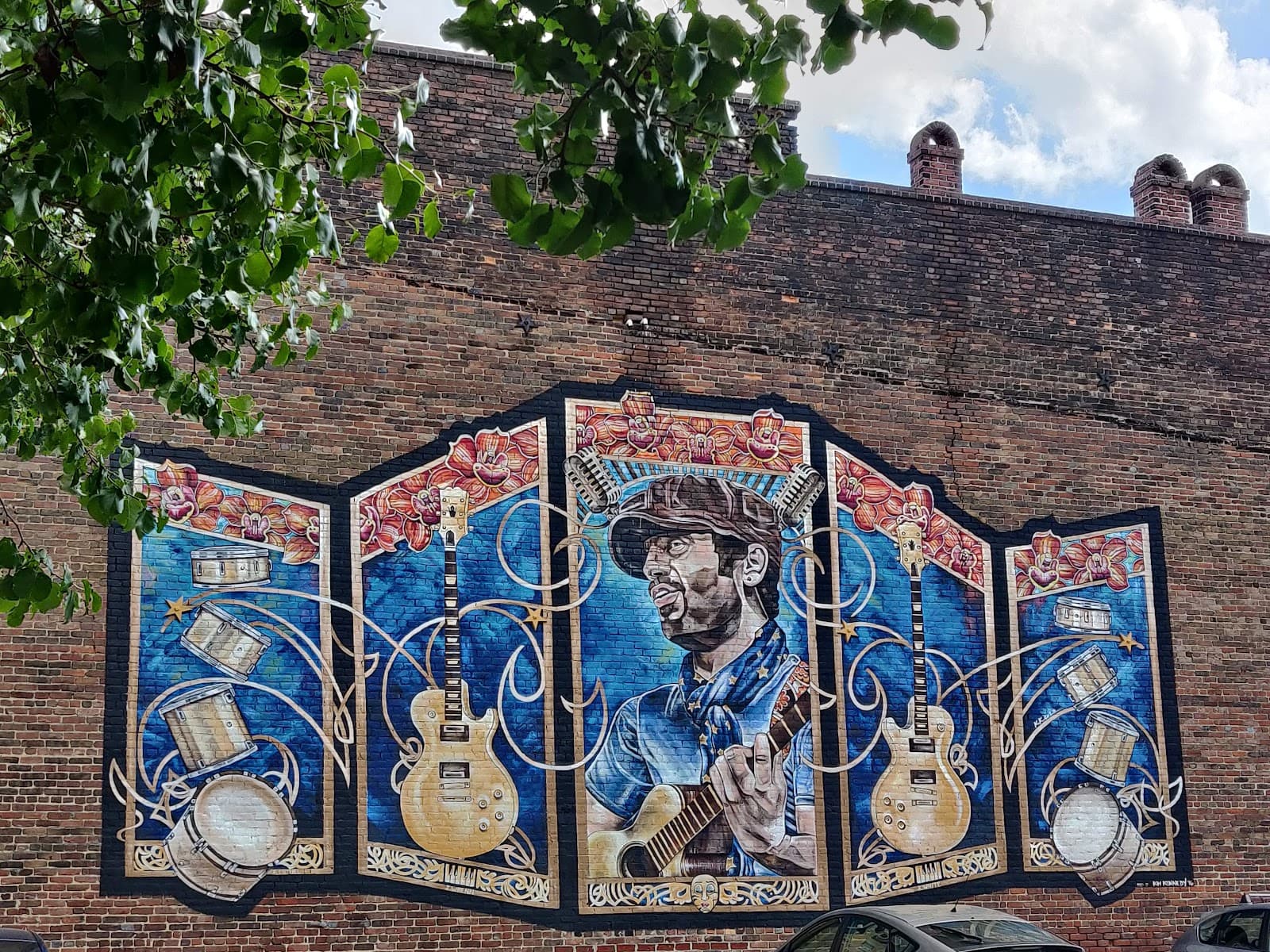
International Civil Rights Center and Museum
Explore the site of the 1960 Greensboro sit-ins, a pivotal moment in the Civil Rights Movement. Experience powerful exhibits and guided tours.

Highlights
Must-see attractions

Social
From TikTok & Reddit
Best Time
Fewer crowds, more personal tours.

International Civil Rights Center and Museum
Best Time
Fewer crowds, more personal tours.

Highlights
Must-see attractions
Explore the site of the 1960 Greensboro sit-ins, a pivotal moment in the Civil Rights Movement. Experience powerful exhibits and guided tours.
"This museum is a MUST visit for everyone!!! A city of courage, resilience, and change."

🎯 Ask for Specific Guides
Darren and Mrs. Jeanne are frequently praised for their passionate and insightful tours.
🚶♀️ Self-Guided Option Available
If you prefer to go at your own pace, a self-guided tour with a documentary is an option.

Highlights
Discover the most iconic attractions and experiences

The Historic Lunch Counter
Original Woolworth's building
Stand where the 1960 sit-ins began. A powerful, preserved piece of history.

Interactive Exhibits
Engage with stories and artifacts detailing the struggle for equality.

Guided Tours
Hear passionate accounts from guides who connect history to today's world.
Plans like a pro.
Thinks like you
Planning Your Visit
Book Your Tour in Advance
Prepare for an Emotional Experience
Best Times
Insider Tips
from TikTok, Instagram & Reddit
🎯 Ask for Specific Guides
Darren and Mrs. Jeanne are frequently praised for their passionate and insightful tours.
🚶♀️ Self-Guided Option Available
If you prefer to go at your own pace, a self-guided tour with a documentary is an option.
⏳ Allow Ample Time
Plan for at least 2 hours to fully absorb the exhibits and documentary.
📸 No Filming Inside
Photography and videography are restricted inside the museum.
Tips
from all over the internet
🎯 Ask for Specific Guides
Darren and Mrs. Jeanne are frequently praised for their passionate and insightful tours.
🚶♀️ Self-Guided Option Available
If you prefer to go at your own pace, a self-guided tour with a documentary is an option.
⏳ Allow Ample Time
Plan for at least 2 hours to fully absorb the exhibits and documentary.
📸 No Filming Inside
Photography and videography are restricted inside the museum.
❤️ Prepare for Emotion
The museum's content is powerful and can be emotionally impactful.
What Travellers Say
Reviews Summary
Visitors consistently praise the International Civil Rights Center & Museum for its powerful and moving portrayal of the Civil Rights Movement, particularly the historic Greensboro sit-ins. Many highlight the exceptional quality of the guided tours, with guides like Darren and Mrs. Jeanne bringing history to life with passion and personal connection. The museum's ability to connect past struggles to present-day issues is frequently cited as a key takeaway, making it an essential visit for understanding American history and ongoing social justice efforts.
"I had an incredible experience at the International Civil Rights Center & Museum in Greensboro today. Our tour guide Darren made this visit truly special - he shared these stories with genuine passion because his own family member was part of this civil rights history. You could tell this wasn't just a job for him; it was personal. Our visit carried extra weight knowing that just yesterday, on September 4, 2025, we lost Major General Joseph McNeil, one of the legendary Greensboro Four, at the age of 83. Being in that museum today, walking through the same spaces where McNeil and his fellow students made history, felt like honoring his memory.
The museum doesn't sugarcoat anything. Darren walked us through the harsh realities of oppression, racism, and how people were treated as less than human simply because of their skin color. As a Black American woman, those harsh realities and visualizations pulled hard on my heartstrings. Hearing these stories made me uncomfortable, and honestly, that's exactly how it should feel. If we're not bothered by injustice, we won't fight to prevent it from happening again. What really got to me was how Darren connected the past to today. He helped us see that learning about these painful chapters in history isn't meant to make us feel guilty - it's meant to make us vigilant. When we understand how discrimination worked then, we can better recognize and stop it now.
The actual museum space is powerful too, especially being housed in the building where the Woolworth's sit-ins began. Standing in that same space where four college students decided to take a stand gives you chills - even more so today, knowing we just lost one of those brave young men who changed history. If you're planning a visit, ask for Darren if he's available. His storytelling brings this history to life in a way that textbooks never could. This place does important work preserving these stories, and everyone should hear them."
Gina Ellis
"This museum is a MUST visit for everyone!!!
Greensboro is home of the historic 1960 sit-ins. Standing in the very space where four young Black students sparked a national movement for justice was humbling and powerful.
Every American should visit this ground zero for civil rights. It’s a city of courage, resilience, and change. Also, a reminder that history lives in the places we choose to remember…"
Carlos Santos
"I love anything dealing with history. The good, the bad and ugly. This museum was so informative and I learned abt so many stories that I had never even heard of before. I opted for the self guided tour so I could be on my own time and schedule reading everything. The tour started with abt a 50min documentary then can proceeded to walk the exhibits. I spent abt 2hrs total here. Great way to learn things while also staying cool from the heat."
Cynthia R
What People Like
What People Dislike
Frequently Asked Questions
🚇 🗺️ Getting There
The museum is located at 134 S Elm St, Greensboro, NC. It's easily accessible by car and is a popular stop for day trips from Charlotte. Parking information can be found on their official website.
Yes, there are several parking options available in downtown Greensboro near the museum. Check local parking garages and street parking regulations.
Absolutely! Many visitors, especially from Charlotte, make it a day trip. It's often paired with other Greensboro attractions.
Driving is common, especially for day trips. Public transportation options within Greensboro are also available.
The museum strives to be accessible. It's recommended to contact them directly for specific accessibility information regarding exhibits and facilities.
🎫 🎫 Tickets & Entry
Ticket prices vary for adults, seniors, students, and children. It's best to check the official website for the most current pricing for international civil rights center and museum tickets.
While walk-ins are sometimes possible, booking international civil rights center and museum tickets in advance, especially for guided tours, is highly recommended to secure your spot.
The museum is typically open Monday through Saturday from 10:00 AM to 6:00 PM. It's always a good idea to verify hours on their official website before your visit.
Discounts are often available for students, seniors, and sometimes for groups. Check their website for details on international civil rights center & museum tickets.
Yes, guided tours are a highlight and often require advance booking for international civil rights center and museum tours.
🎫 🧭 Onsite Experience
Many visitors highly recommend taking a guided tour. Guides like Darren and Mrs. Jeanne are praised for their passionate storytelling that brings the history to life.
No, photography and videography are generally not permitted inside the museum to preserve the exhibits and the solemn atmosphere.
A self-guided tour can take about 2 hours, while a guided tour might be around 50 minutes to an hour, plus time to explore exhibits.
You'll see the preserved lunch counter, interactive exhibits, and powerful displays detailing the Greensboro sit-ins and the broader Civil Rights Movement.
Yes, it's considered a valuable learning experience for children, though the content can be emotionally impactful. Parents are encouraged to prepare them.
🍽️ 🍽️ Food & Dining
Yes, downtown Greensboro offers various dining options. Print Works Bistro is a popular choice often mentioned alongside a visit to the museum.
No, food and drinks are typically not allowed inside the museum exhibits. There are nearby restaurants for dining.
You can find a range of options from casual cafes to more upscale dining in the downtown Greensboro area.
📸 📸 Photography
Photography and videography are not allowed inside the museum. However, you can take photos of the exterior of the historic Woolworth building.
You can find images on social media platforms like Instagram and TikTok, or through an online search for 'international civil rights center & museum photos'.
The front facade of the historic Woolworth building, where the museum is located, is a significant landmark for exterior shots.
For Different Travelers
Tailored advice for your travel style
👨👩👧 Families with Kids
Consider opting for a guided tour, as guides can tailor their explanations to different age groups. It's a powerful opportunity to teach children about the importance of equality, courage, and standing up for what's right. Prepare them beforehand by discussing the general themes of the Civil Rights Movement to ensure they can process the information effectively.
📚 History Enthusiasts
You'll find meticulously preserved artifacts, compelling narratives, and a deep dive into the strategy and impact of the sit-in movement. The museum's location in the original Woolworth's building adds an unparalleled layer of authenticity to the experience.
🚶 Day-Trippers
It's easily combined with other Greensboro attractions, such as the Print Works Bistro for lunch. Plan your visit to include a guided tour to maximize your understanding and impact within a limited timeframe. Remember that photography is not allowed inside, so focus on absorbing the experience.
Deep Dives
In-depth insights and expert knowledge
The Greensboro Sit-Ins: A Turning Point
The museum meticulously preserves the original lunch counter and surrounding area, allowing visitors to stand in the space where history was made. Through powerful exhibits and personal testimonies, the museum educates visitors about the courage, resilience, and strategic nonviolence employed by the protestors. It highlights how this movement was not just about food service but a broader fight for dignity and equality.
Many visitors emphasize the profound impact of experiencing this history firsthand. The museum's mission is to ensure these stories are not forgotten and to inspire future generations to stand up against injustice. The Greensboro Four (Ezell Blair Jr., David Richmond, Franklin McCain, and Joseph McNeil) are central figures in this narrative, and their bravery continues to resonate.
The Power of Guided Tours
These guides often have personal connections to the Civil Rights Movement, bringing a unique passion and authenticity to their narratives. They don't just recite facts; they share stories that make the history tangible and deeply personal. This approach helps visitors understand the harsh realities of segregation and the immense courage required to challenge it.
Taking a guided tour is often described as an unforgettable experience that provides context and deeper meaning to the exhibits. It's an opportunity to ask questions and engage with the history in a way that a self-guided visit might not offer. For many, it's the highlight of their visit and a crucial part of understanding the museum's message.
Connecting Past to Present
Guides and exhibits often draw parallels between the segregation faced in the 1960s and modern-day challenges. This helps visitors understand that the fight for civil rights is not a closed chapter but an ongoing process. The museum aims to foster a sense of vigilance and encourage active participation in creating a more equitable society.
This connection makes the visit particularly impactful, prompting reflection on how far society has come and how much further it still needs to go. It serves as a powerful reminder that history lives in the places we choose to remember and that understanding past injustices is key to preventing future ones.






Social
from TikTok, Instagram & Reddit